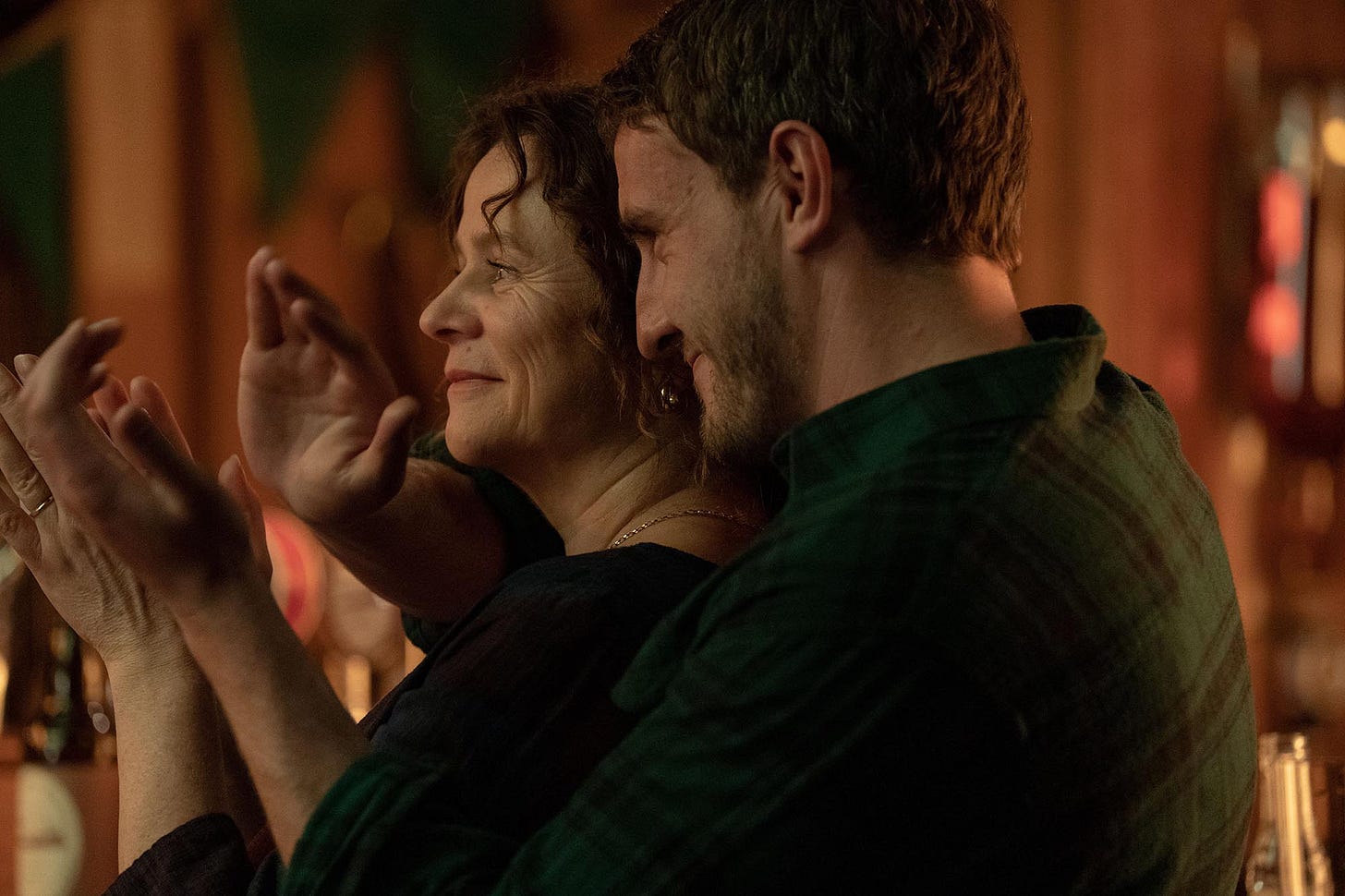God's Creatures
Emily Watson anchors this grim, determined drama about an Irish mother whose choice to lie to protect her son has shattering consequences
You can see the moment her prodigal son, Brian, enters the room that Aileen O’Hara (Emily Watson) regards him as the apple of her eye.
Her bright blue eyes, usually dulled from a life of drudgery — working in a fish processing factory, caring for her elderly, unresponsive father-in-law — suddenly shine brightly as if a fire were lit inside. She hugs Brian (Paul Mescal) like a newborn, dances a jig with him at the bar, almost as if she were a schoolgirl smitten with her first crush.
That matronly love is put to the test in “God’s Creatures” when Brian is accused of sexually assaulting Sarah Murphy (Aisling Franciosi), a coworker and friend. Her first instinct is maternal — protect her child at all costs — so she lies to the police to provide him an alibi.
She justifies this to herself through ferocious devotion to her son. He’s a gentle soul who’s never laid a hand on a woman in his life, she insists. He and Sarah used to go together when they were younger, so maybe there was confusion about the nature of their encounter.
But as the lies pile up, both out of Aileen’s mouth and inside her own mind, it takes a gradual toll on her soul that begins to outweigh the love she has for Brian. She starts to shy away from him, looks at his handsome face askance, even brushes off his warm caresses.
That’s the central dramaturgy in “God’s Creatures,” directed by Saela Davis and Anna Rose Holmer from a screenplay by Shane Crowley, who also shares a story credit with Fodhla Cronin O'Reilly.
The movie’s challenge is that there really isn’t much else going on in the movie, and the lack of suspense in the singular thread becomes a burden. We sense where the story is going to go and must simply abide the long, slow disconnect Aileen is making with Brian.
When the end came, I wasn’t surprised one bit.
Watson is as gifted an actress there is working in film today, but directors Davis and Holmer keep things very observational and slow-moving. We watch Aileen as she goes about her workaday chores and encounters, unable to look away from Sarah whenever they are in the same place. It’s as if her shame is a scarlet letter sewn onto her face that she is unable to hide.
It would have been more interesting if Aileen wavered back and forth in her feelings of guilt and loyalty, so we could really feel the internal struggle she’s having. Instead, it plays out entirely as observed behavior.
Brian has recently returned home, without announcement, after a number of years away living in Australia. We sense he left under less than ideal circumstances, possibly a clash with his father, Con (Declan Conlon), the rare man in town with an office job. He got out of the fishing industry and is pained that Brian is returning to it.
He wants to take over the oyster farming claim that was the legacy of his grandfather, Paddy (Lalor Roddy), who now sits mute and unspeaking inside Aileen’s home — occasionally giving her an unthinking slap across the face. She absorbs the abuse because, to her, that’s just part of her life as a woman and mother.
The oysters are grown in bags suspended in the tidal waters just off the coast. The men trudge out there at low tide in waders to attend to them; it’s dangerous work because they can quickly become swamped when the waters rise. As the story opens, the son of Mary (Marion O'Dwyer), who also works at the factory, dies in one such accident.
It takes at least a year for new oysters to grow to harvest size, and all of Paddy’s bags have dissolved to nothing. So Aileen helps by pilfering a few from her factory. Brian also augments his income by going out in his boat in the middle of the night to poach from other farmers, just enough so they won’t notice, which he sells on the black market.
Perhaps it’s this association in minor crimes between Aileen and Brian that propels her to lie when Sarah accuses him of raping her. She knows she’s fibbing because she was at Dan Nell’s bar with Brian when he met up with Sarah, leaving for home in a bit of an annoyed huff because she’d been effectively traded in for the attentions of a younger woman.
As Sarah, Franciosi isn’t given much to work with, existing as a plaintive victim figure, haunting about the village with an accusing stare. All we really know about her is that she has a lovely singing voice and a controlling older boyfriend, Francie (Brendan McCormack).
This film should have a Dostoevsky feel — the walls of guilt and shame gradually closing in on the main character after her moral failing. Instead, “God’s Creatures” is more of a slow fade of motherly affection.
It’s a slow-moving movie with lots of lengthy, wordless shots of things like someone driving a car along the coastline or pulling fish off the conveyor belt for processing. A little of that goes a long way, and it’s almost like the filmmakers are trying to achieve through quantity an emotional response they couldn’t actually distill into distinct, qualitative scenes.
There’s the bones of a good story here, but “God’s Creatures” is content to pick at the scales rather than knife into the guts of it.
God





